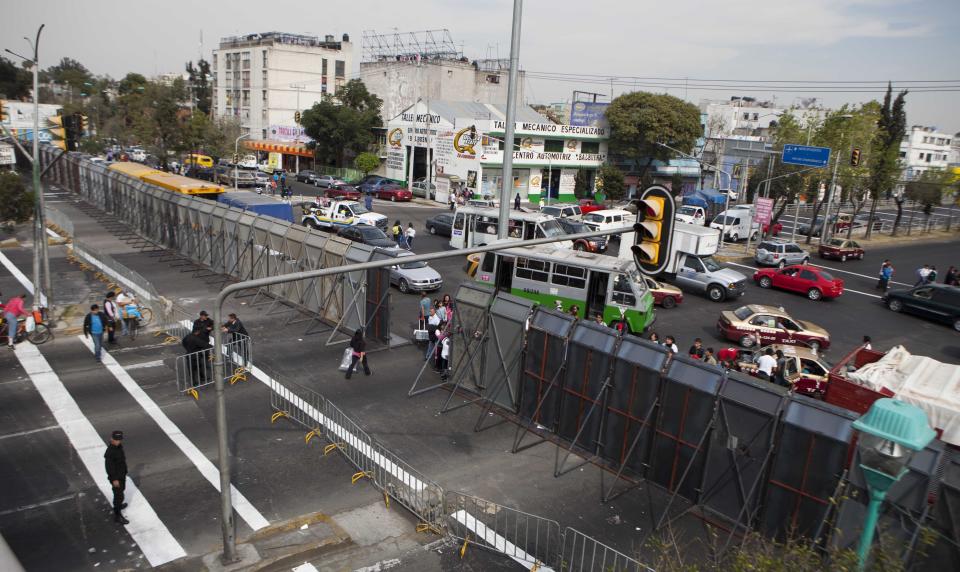Mexico subdued ahead of PRI resuming presidency
MEXICO CITY (AP) — Mexico's first democratically elected president started his inauguration day breakfasting with homeless children and ended it with fireworks — a festive day meant to usher in a bright new era.
Six years later power was handed off in chaos, with a narrow, disputed election spawning fistfights in Congress and a seizure of the podium by leftist lawmakers.
On Saturday, the country's former longtime ruling party retakes the highest office on a day planned to be low on pomp and extraordinarily high on security — a drama-free return to power for an Institutional Revolutionary Party trying to replace a history of repression and corruption with a new image of businesslike, technocratic efficiency.
A full week before the inauguration, the federal government began build a blocks-long enclosure of metal barricades around the lower house of Congress, where the PRI's Enrique Pena Nieto will be sworn into office Saturday.
The new president will later deliver an address to the nation from the colonial-era National Palace, then retire to a hilltop castle inside Mexico City's largest park for lunch with a small group of visiting leaders, including U.S. Vice President Joe Biden.
There are no grandstands being built, no parades planned and no talk of which designer the new first lady will choose.
The reticence, experts say, appears designed to allay trepidation about the return of the party that exercised near-total control of the country for 71 years, ending with the 2000 election of President Vicente Fox of the National Action Party.
"This appears to be the tone Pena Nieto is setting," said Federico Estevez, a political science professor at Mexico's Autonomous Technological Institute. "The night of his win, he gave a speech that was low-energy, somber, half-solemn and really without joy. It seems like something similar is planned for his inauguration."
Adding to the lack of the popular excitement is deep cynicism about all of Mexico's political parties, exhaustion with the waves of violence unleashed by departing President Felipe Calderon's six-year militarized offensive against drug cartels, and sour memories of the paralysis set off by the 2006 dispute around Calderon's election.
"When Fox came to power there was a lot of excitement, there was a party in the streets, but now things are really different. People don't really feel like celebrating, above all because of what the current government has done with the war against drugs," said Roberto Rodriguez, 47, a worker at a financial firm.
Even the opposition appears to be going along with the mood of restraint.
Despite vocal anger about the fortification of the House of Deputies, the country's main leftist party has pledged not to swarm the podium this time, and it plans no mass protests like those that paralyzed central Mexico City six years ago. The Democratic Revolution Party even agreed Tuesday to sign a pact this week to work with Pena Nieto to pass legislative reforms, before a revolt within the party forced its leader to back away from that pledge.
The Institutional Revolutionary Party, known as the PRI, seems keenly aware of lingering resentment over allegations of vote fraud in the July 1 election and favorable treatment of Pena Nieto's candidacy by Mexico's powerful Televisa media empire. Resentment is particularly high in the liberal bastion of Mexico City.
"The PRI doesn't want to cause a scandal because the people aren't happy with this president. They knew he didn't win cleanly and they know that provoking the people will create a disturbance," said Tania Nicolas, a 24-year-old biochemical engineer taking a lunch break in the capital.
That awareness by the PRI may be serving to tamp down any impulse to openly rejoice among Pena Nieto's supporters, said Rene Torres Ruiz, a political analyst and political science professor at Iberoamerican University in Mexico City.
"There's a certain understanding among PRI members that even though this is a historic, meaningful and important moment for Mexico that could be celebrated from the rooftops, there's still a feeling of unease among the political elite and much of the population," Torres said.





